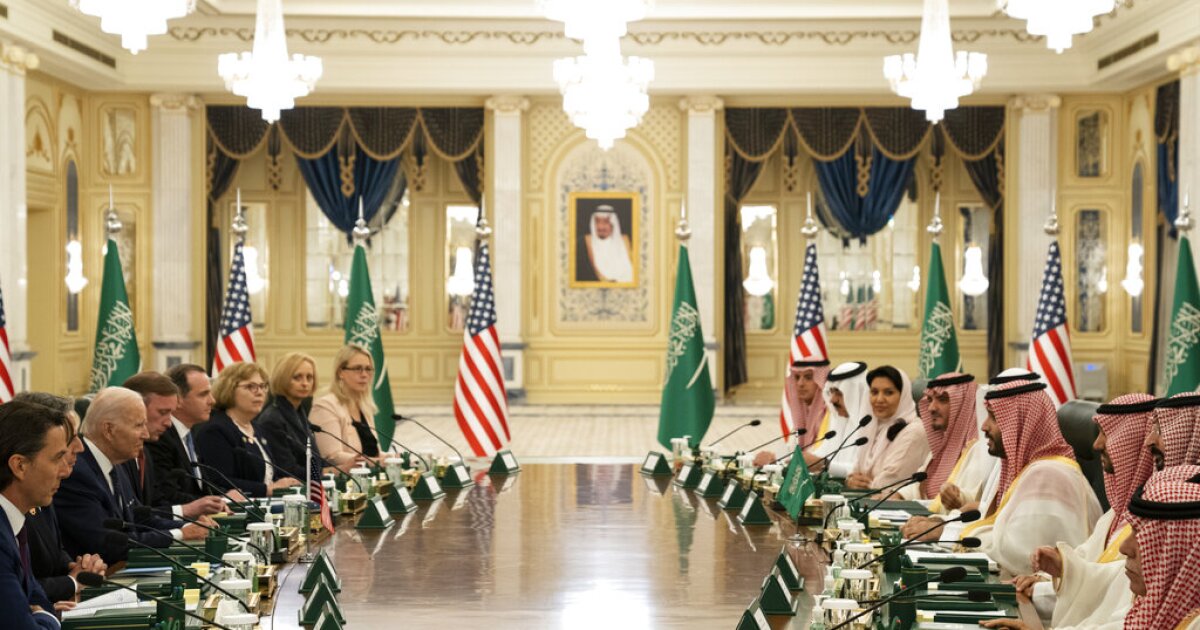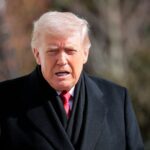

JEDDAH, Saudi Arabia — After meeting for three hours Friday night, a split screen illustrated the conflict over how President Joe Biden and Saudi leaders addressed the case of Jamal Khashoggi, who in 2018 walked into the Saudi Embassy in Istanbul and never reemerged.
Speaking to reporters in Jeddah late Friday, Biden said he told Saudi Crown Prince Mohammed bin Salman directly that he still holds him responsible for the Washington Post journalist’s brutal murder. Saudi officials, by contrast, likened the U.S. assessment of Khashoggi’s death to faulty WMD intelligence ahead of the Iraq War.
“I raised it at the top of the meeting, making clear what I thought of it at the time and what I think of it now,” Biden said in remarks. “He basically said that he was not personally responsible for it. I indicated that I thought he was.”
BIDEN LOOKING FORWARD TO MEETING SAUDI LEADERS ‘LIKE A ROOT CANAL’
The president promised on the campaign trail to make the “pariah” kingdom “pay” for Khashoggi’s death and, upon taking office, released a U.S. intelligence report that deemed the crown prince responsible.
Asked this week whether he planned to hold the crown prince to account when the two met, Biden responded only that he has “never been quiet” about human rights.
“I would like to thank President Biden for raising my husband, Jamal Khashoggi’s murder with the Crown Prince. He raised it first and foremost and for that I am grateful,” Khashoggi’s widow, Hanan Elatr, said in a statement. “I also would like to thank President Biden for fulfilling Jamal’s true legacy, which is to highlight the issue of human rights and political prisoners.”
In a parallel briefing with reporters, Adel al Jubeir, the Saudi minister of state for foreign affairs, invoked the intelligence failures that drove America to war in Iraq to call into question the U.S. investigation and its abuse of renditioned prisoners to implicate its systems of accountability.
“We saw what happened to the assessment of Saddam Hussein having nuclear weapons,” al Jubeir said in a private room at the Jeddah InterContinental hotel. “Did George Bush direct people to torture people at Abu Ghraib? No, he didn’t. This happens. Mistakes happen.”
A Saudi official told the Washington Examiner that there was also no discussion about resolving cases involving prisoners of conscience, the term used to refer to political detainees.
This was among the issues Khashoggi’s widow had hoped Biden would broach, explaining to the Washington Examiner after meeting with White House officials in Washington on Tuesday that to do so would be “to heal the wound of Jamal, which is the people behind bars.”
The official said Biden made a broader point about the importance of human rights but suggested the dynamic lacked the fiery denunciation Biden relayed. “Every president raises it,” the official said.
As speculation swirled over the tone of the talks, Saudi Arabia’s foreign ministry published a video of the meeting — without audio. Al Jubeir disputed any difference in how the leaders came away with the back and forth over Khashoggi.
“There’s nothing to agree or disagree with. It was addressed,” he said of the killing. “It wasn’t a discussion like you think it was.”
The former ambassador said the leader-to-leader talks were about fixing the contours of a relationship, not hashing out gripes.
“It wasn’t a visit with a checklist,” he said. “That’s not what presidents do.”
Al Jubeir was joined at the table by Princess Reema bint Bandar bin Sultan of Saudi Arabia, the kingdom’s U.S. ambassador, both eager to frame the discussion as oriented toward the future and decoupled from the mania of global markets.
“We moved on very quickly to the state of affairs of — the world is in distress, and the world needs the kingdom and the United States to be working together,” the princess said, characterizing the talks as “clear, candid, direct.”
And while Biden teased the prospect of an oil boost from the Gulf kingdom, this was not the message shared by the president’s Saudi counterparts.
Neither al Jubeir nor the princess revealed how Saudi Arabia could alleviate some of Washington’s gravest concerns, including soaring gasoline prices and its stalled efforts to punish Russia economically for its war in Ukraine through a sanctions program that has ricocheted back to Western consumers.
CLICK HERE TO READ MORE FROM THE WASHINGTON EXAMINER
“We are a long-term producer of energy,” al Jubeir said, reiterating the kingdom’s position as the swing producer atop the Gulf Cooperation Council. “If there’s too much supply, we remove it. If there’s not enough supply, we increase it.”
He continued: “We base that on fundamentals — not on speculation, not on hysteria, not on geopolitics.”





